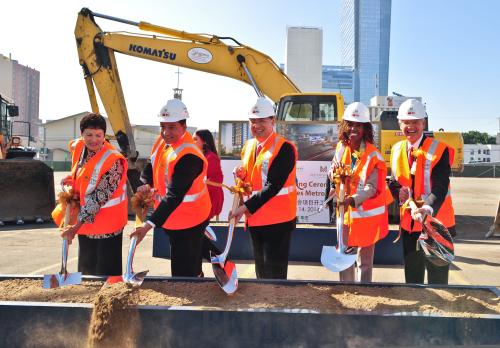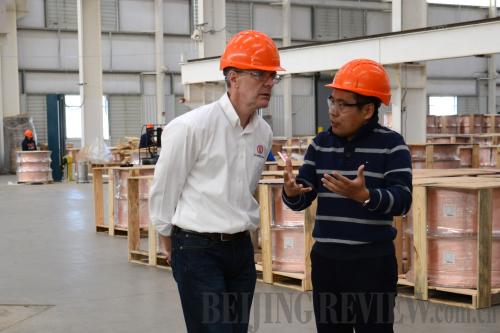|
 |
|
Zhang Yuliang (center), Chairman and President of Shanghai-based property developer Greenland Group, and Kelli Bernard (second right), Los Angeles' Deputy Mayor for Economic Development, attend a groundbreaking ceremony for Greenland's $1-billion project in downtown Los Angeles on February 14, 2014 (XINHUA) |
For all the fear-mongering that comes along with discussions over China's rise in economic and geopolitical power, there has been one topic overlooked: the creation of American jobs. Even the harshest China critic could be stumped when considering the latest data release on Chinese direct investment into the United States—Chinese manufacturers are in the United States, hiring local workers, paying competitive salaries and reinvigorating small-town America.
Since 2000, Chinese firms have spent $46 billion on outbound direct investment (ODI) into the United States, 90 percent of which was made in the past five years. These investments, totaling 1,583 establishments, are distributed in some of the poorest areas of America. More than 80,000 Americans now work for Chinese-affiliated companies, according to a newly released report entitled New Neighbors: Chinese Investment in the United States by Congressional District—commissioned by the National Committee on United States-China Relations (NCUSCR).
"Ten years ago, investment flows became two-way. Chinese companies began to invest here," said NCUSCR President Stephen Orlins at the committee's annual meeting in New York on May 20. "What was a trickle has become a stream and it's probably going to become a river. Chinese capital is providing 80,000 jobs today and will likely provide between 200,000 and 400,000 jobs at the end of this decade. It will change the way many Chinese and Americans think about each other."
For example, Chinese firm Golden Dragon Precise Copper Tube Group, based in central China's Henan Province, built a $100-million manufacturing facility employing 300 workers in one of the poorest counties in the United States in Thomasville, Alabama, in May 2014.
Wilcox County has not had a major industrial announcement in nearly four decades, and the new factory serves as a vehicle to lift families out of government assistance and to provide young people with an incentive to stay in their communities. Sixty percent of the factory's workers are minorities, said Thomasville Mayor Sheldon Day, and 60 percent are women, supporting mostly single-parent families.
Mayor Day refers to Golden Dragon as Thomasville's "Chinese friends" and spoke of the town's eagerness to be sensitive to Chinese culture and customs when welcoming them to the community. It's a strategy that helped the small town of 5,000 people beat out 62 other municipalities like Dallas to win Golden Dragon's investment.
More Chinese investments
The NCUSCR partnered with economic research firm Rhodium Group (RHG) to conduct the study. The data was pulled from RHG's China Investment Monitor that logs direct investments over $500,000 and acquisitions of at least a 10-percent stake in U.S. companies. The study's authors then matched the Chinese investment to U.S. congressional district to study the local impact.
"We want to dial down the anxiety based on sentiment and replace it with some thoughtful, considered basis for the United States and China to work through the new issues and new challenges that arise as the relationship unfolds," said Daniel Rosen, founding partner of RHG.
ODI has "always been an important part of the American story," Rosen said, from the commercial founding of New York City as New Amsterdam. Since then, direct investment has enabled the United States to deepen its manufacturing base, enrich technological capabilities and become a global investor itself. ODI is not buying up treasury bonds and signing trade deals—it encompasses new greenfield projects like factories and acquisitions that provide jobs and stimulate local economies.
China still makes up a small percentage of overall ODI into the United States compared with Europe and Japan, but the growth rate has been dramatic. In the past five years Chinese ODI into the United States has grown 631 percent, compared with 52 percent growth in the previous five years. Meanwhile, exports from China have slowed. It's an important shift, Rosen said, which will have real benefits for American workers.
"All of the good things that have happened previously to our two economies, none of them entailed new assets coming to America. We had products that were cheaper, and hence our consumers could consume more, and we had American assets going to China, which was great for those companies and great for China in many ways," Rosen said. "But this new story that we're talking about is about assets coming to our country placed here by citizens and firms of another country. It's the first time it has been a key part of the [China-U.S. economic] story and it is something to be excited about."
Though 78 percent of U.S. congressional districts have a Chinese ODI project, public and political sentiment continues to be suspicious of Chinese investment. According to a 2012 Gallup-China Daily USA Poll, only 23 percent of respondents agreed that Chinese investment into the United States creates growth and jobs, while 32 percent did not agree and 45 percent said they didn't know or had no opinion.
With the spread of Chinese ODI into rural areas, however, more Americans are coming into contact with Chinese companies in their communities. North Carolina, for example, a state that has suffered from competition with cheap Chinese exports in textiles and furniture, is now one of the top recipients of Chinese ODI with nearly $5.5 billion in investments and 15,000 jobs provided by Chinese employers like Lenovo. Such investments should go far in shifting public opinion.
"Chinese investment is not only going to the rich parts of the country. The majority of Chinese investment is going to areas of low-to-medium household incomes. The most tangible benefit from a local perspective is, of course, jobs," said RHG Director Thilo Hanemann.
The jobs being created are typically blue-collar manufacturing jobs, Hanemann said, but also, increasingly, tech and R&D jobs. Chinese companies are increasingly ready and able to pay market prices for technology assets and spend hundreds of millions of dollars funding R&D at U.S. operations and employing America's best and brightest.
 |
|
Golden Dragon North America's president Roger Zhang (right) and executive vice president Keith Weil have a discussion in the company's copper tube plant in Wilcox County, Alabama, on January 21 (XINHUA) |
Cultural challenges
Another Chinese firm Fuyao Glass Industry Group, China's number one glass manufacturer headquartered in Fujian Province, made its first investment in the United States in South Carolina in 1995. Since then, it has built two factories and design centers in Alabama and Michigan, employed 220 locals and spent $200 million acquiring its first large manufacturing facility in Dayton, Ohio. The revival of the Dayton plant, a General Motors factory that shuttered in the economic recession, will provide an estimated 2,030 jobs when fully operational next year. Entry-level workers can expect to be paid $12-$14 an hour, similar to wages for other area manufacturers. The state of Ohio offered $14 million in grants and tax incentives to Fuyao to encourage their investment.
Fuyao, led by Chairman Cao Dewang, has committed to being a good corporate citizen in the small-town Midwestern community, working with labor unions, paying competitive wages and making donations to local institutions such as the University of Dayton.
"Fuyao has invested in nine countries around the world," said Chairman Cao, "The United States has a complete legal system, so we are okay there, but culturally, I have to admit there are large challenges."
The largest challenge for Fuyao is training U.S. workers into management positions, according to Cao. In China, he said he is accustomed to promoting promising low-level workers to management positions, assured of the individuals' loyalty. In the United States, labor unions are aggravated when their members are recruited to fill management positions. It's a new challenge for a Chinese company unfamiliar with the history of U.S. organized labor.
"The United States has a great investment environment. There are many white-collar workers, and their salaries are very competitive. U.S. white-collar worker salaries are about three times that in China. In terms of blue-collar workers, the picture is a little different—the salary in the United States is about eight times that of China," Cao said. "I see problems there and it is one of the reasons for the hollowing of the U.S. manufacturing industry in general."
Though blue-collar salaries and union demands are a challenge for Fuyao's U.S. operations, Cao said he was committed to maintaining a positive relationship with his workers and with the local community. He met with union leaders and factory workers to relate his own story from pedaling cut tobacco as a 16-year-old to becoming one of China's top entrepreneurs. Though reluctant to take on the union obligations with the purchase of the plant, Cao said he felt it was only fair considering "the workers were there first."
"We need to make concessions," Cao said. "So we invited them to have a conversation. I told them I came from poverty. We discussed what they need and what we need, and we came to a consensus. Now, we have a great relationship with the union."
Job prospects
If China's ODI into the United States follows the curve of other economies such as Japan in the 1980s, the United States can expect hundreds of thousands of jobs created from China's ODI in the next five years. Japanese-affiliated companies today employ more than 700,000 Americans. Japanese companies export goods from their bases in America and spend millions on R&D.
"If we look at where China is as a local investor today and we bravely project how much more Chinese outbound investment is going to take place in the years ahead … $700 billion of Chinese global investment is nothing compared to where China is headed," Rosen said. "We'll see $2 trillion and then $4 trillion in Chinese outbound investment around the world in 2020. A good chunk of that has the potential to come to the United States."
The future, however, is far from a "done deal," Rosen said, and a coordinated political approach on the local, state and federal level to attract and welcome Chinese investment is needed.
"It's not just a question of whether our local mayors get it right. They aren't just competing with the mayor next door; they are going to compete against Germans and Swiss, French, Australians, Canadians and people all over the world who are at least as eager to land some of these investments. It's local officials competing in an international environment and every branch of the U.S. Government will need to have a role to play to make it possible for hardworking local officials to win that fight," Rosen said.
The Thomasville success story and Mayor Day are now inspiring other small towns around America to look overseas to attract new jobs and economic opportunities. As Chinese companies continue to ramp up ODI, more Americans may find themselves earning Chinese paychecks. The cultural implications are vast, and the opportunities to transform the U.S.-China economic relationship are great. With success stories like Thomasville, America can no longer consider China an economic rival—and instead can view Chinese companies as other globalized investors—on equal footing.
"This is the first, but it will not be the last Chinese company that comes to Alabama," said Alabama Governor Robert Bentley, speaking at a ceremony celebrating the signing of the Golden Dragon investment deal.
The author is a contributing writer to Beijing Review, living in New York City
Copyedited by Kylee McIntyre
Comments to yushujun@bjreview.com
| 